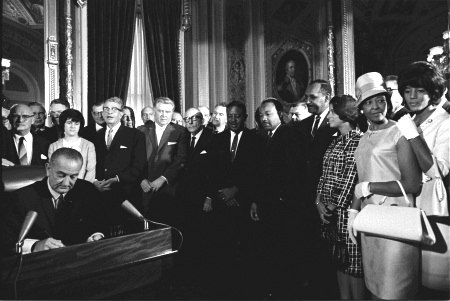Lyndon Johnson, who became president following the assassination of John F. Kennedy, sailed to a landslide victory in the 1964 presidential election. After the election, Johnson moved to do something about voting rights.
 |
|
President Lyndon Johnson signs the Voting Rights Act of 1965. (Wikimedia Commons) |
Southern states had historically deprived the vote from millions of African-American citizens. Although guaranteed by the 15th Amendment, the right to vote had been denied blacks through discriminatory legal strategies, economic intimidation, and physical threats. The civil rights movement had focused on voting rights, particularly during Freedom Summer in Mississippi in 1964. President Johnson delivered an impassioned speech to the nation on March 15, 1965, recognizing the problem and urging a national legislative solution. He specifically called attention to the widespread efforts of whites to keep black people from the most important function of democracy — choosing their own representatives in government. Pointedly, Johnson ended his speech with the historic words of the national civil rights anthem, “We shall overcome.”
The president and other supporters of a voting-rights act knew that only strong federal legislation could address the problem of voting discrimination. From 1961 to 1965, the U.S. Justice Department had filed many lawsuits against state and local officials in the South, mostly in Mississippi. Even when successful, these lawsuits rarely had much impact because white officials kept finding new ways to avoid their legal duties.
President Johnson’s support of the Voting Rights Act of 1965 reflected the pressures from the massive civil rights protests of the early and middle 1960s. As in the Civil Rights Act of 1964, Johnson’s political skills worked wonders. He was aided by highly publicized voting-rights demonstrations throughout the South. On March 7, 1965, police officials savagely attacked non-violent civil rights marchers at the Edmund Pettis Bridge in Selma, Alabama. Widely repeated on television news programs, this horrific incident aroused public opinion in favor of the pending voting-rights legislation.
Signed in August 1965, the act struck down two methods Southern whites had long employed to keep blacks from voting — literacy tests and poll taxes. The act also authorized the Justice Department to send federal registrars and observers to the South to register black voters and to guarantee the fairness of local and state elections. Finally, the Voting Rights Act required states to submit any changes in their voting laws and procedures to the Justice Department or to the federal district court in Washington, D.C., for approval.
Like the Civil Rights Act of 1964, this legislation came under swift legal attack. But the Supreme Court in 1966 in South Carolina v. Katzenbach rejected this challenge. It ruled that the act fell under Congress’s power to enforce the requirements of the 15th Amendment, which had been ratified in 1870.
The Voting Rights Act of 1965 had immediate and dramatic results. Within two years with the help of many volunteers, African-American voter registration throughout the South increased to more than 50 percent of the voting-age population. Mississippi’s black voters in particular benefited from this legislation, moving from the lowest percentage of eligible voters to the highest. Again, the civil rights movement had garnered a major legal victory, further moving the nation to a fuller recognition of its ideals of democracy and racial equality.
For Discussion and Writing
- What did the Voting Rights Act of 1965 do? Do you think it was effective?
- What problems of discrimination exist in America today? Do you think laws can remedy these problems? Explain.
For Further Reading
Bullock III, Charles S. & Ronald Keith Gaddie. The Triumph of Voting Rights in the South. Oklahoma: University of Oklahoma Press. 2009.
Laney, Garrine P. The Voting Rights Act of 1965: Historical Background and Current Issues. New York: Nova Science Publishers. 2011.


